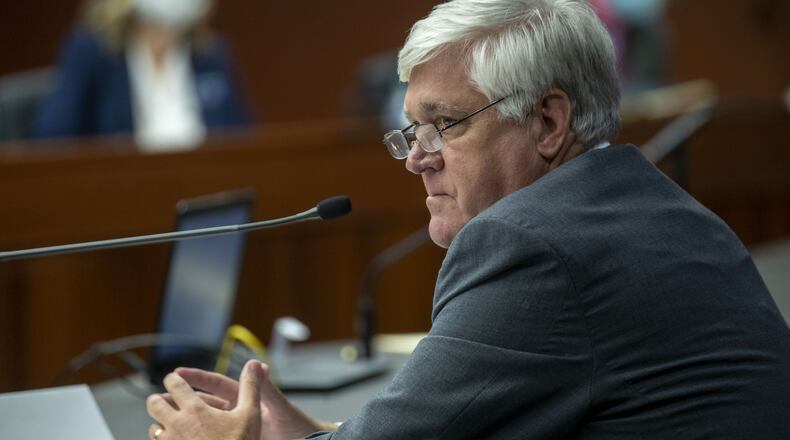On a party-line vote, a Georgia Senate panel on Friday approved a bill that would create a hate-crimes law that would also extend additional protections to police.
Five Republican members of the Senate Judiciary Committee voted to include first responders — defined as police officers, medics and firefighters — in a bill that originally was introduced to protect people who are targeted due to characteristics such as race, gender or sexual orientation.
"There are wives of police officers who've been quoted in the newspaper telling their husbands, 'Do not bring your police cruiser home and park it in our driveway, because we are afraid,' " said Sen. Bill Cowsert, the Athens Republican who authored the change.
The panel’s three Democrats voted against the bill.
The Georgia House in March 2019 approved House Bill 426, which would give sentencing guidelines for anyone convicted of targeting a victim based on race, color, religion, national origin, sexual orientation, gender, mental disability or physical disability.
Credit: Alyssa Pointer
Credit: Alyssa Pointer
The bill's sponsor, Rep. Chuck Efstration, a Dacula Republican, called the addition of law enforcement to his measure a "poison pill."
“This is not about support for law enforcement,” Efstration said after the vote. “This is about the legislative process being utilized by the state Senate in order to take a bipartisan measure and cause division (by bringing) about a provision with the purpose of causing Democratic opposition to the bill.”
Cowsert and Augusta Democratic state Sen. Harold Jones had a lengthy and at times contentious exchange during the hearing, with Jones questioning the need for additional protections for police.
“You’re telling me you don’t think our first responders should be protected from attacks?” Coswert asked.
Jones pointed to a 2017 law that expands protections to officers who are assaulted while in the line of duty.
“I have … and this legislative body has shown over and over that it will protect law enforcement,” Jones said. “Why put it in a bill that has been triggered by the actions … done by the state against (black people)?”
Credit: Alyssa Pointer
Credit: Alyssa Pointer
The legislation comes at a time when the killings of black men at the hands of white men have spurred weeks of protests across Georgia and the country calling for an end to police brutality and racial justice. Two of those high-profile deaths occurred in Georgia.
A white police officer last week shot and killed Rayshard Brooks, who was black, at an Atlanta Wendy's. Ahmaud Arbery, who was black, died in February when he was followed by three white men in the Brunswick area and shot. Arrests have been made in both killings.
Sen. Elena Parent, an Atlanta Democrat, attempted unsuccessfully to remove the protections for police, saying the purpose of the bill wasn't to protect people based on their occupation.
“The farther you get from talking about groups where there are actual immutable characteristics and it’s an intrinsic part of who they are, the more disrespectful it seems to be to the groups that have suffered discrimination,” Parent said.
House Speaker David Ralston has spent the past six weeks urging senators to adopt the version of the measure that passed his chamber last year by a vote of 96-64 — just clearing the 91-vote threshold for approval.
After calling HB 426 as presented one of the weakest pieces of hate-crimes legislation in the country, Lt. Gov. Geoff Duncan, the Senate's president, earlier this week unveiled an expansive measure that would have created a stand-alone charge for bias-motivated crimes and mandated data tracking among other proposals.
Senate Republicans instead opted to amend HB 426 to include protection for police and not adopt any of Duncan’s proposals.
“I appreciate the work that the House has put into this issue, and adding first responders deserves to receive widespread support,” Duncan said in a statement. “In recent months, we’ve seen hate crimes against regular citizens, and we’ve seen hate crimes committed against first responders. Neither are acceptable, and we will not tolerate it in our state.”
Georgia is one of at least four states without such a hate-crimes law, and powerful corporate and political leaders have pressured state leaders to act. A 2000 hate-crimes law was struck down by the Georgia Supreme Court in 2004 for being “unconstitutionally vague.”
If HB 426 became law, a person convicted of a crime and proved to have been motivated by bias would face an additional punishment ranging from three months to a year in jail and a fine of up to $5,000 for a misdemeanor offense to at least two years in prison for a felony offense.
If the amended HB 426 is approved by the Senate, it will require a new vote in the House.
About the Author
Keep Reading
The Latest
Featured







